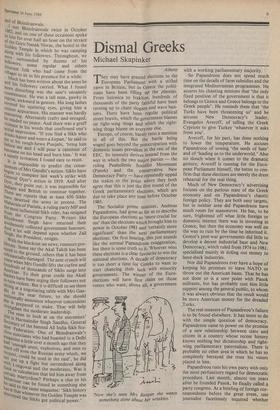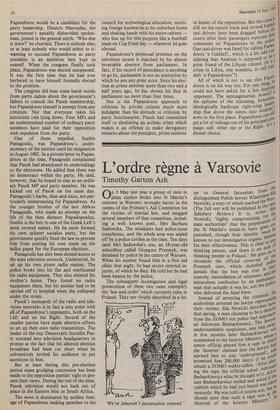Dismal Greeks
Michael Skapinker
Athens They may have greeted elections to the European Parliament with a stifled yawn in Britain, but in Greece the politi- cians have been filling up the plateias. From Salonica to Iraklion, hundreds of thousands of the party faithful have been turning up to chant slogans and wave ban- ners. There have been regular political street brawls, which the government blames on right-wing thugs and which the right- wing thugs blame on everyone else.
Europe, of course, barely rates a mention in all of this. But the battle being waged goes beyond the preoccupation with domestic issues prevalent in the rest of the EEC. Its intensity derives instead from the way in which the two major parties — the ruling Panhellenic Socialist Movement (Pasok) and the conservative New Democracy Party — have repeatedly upped the stakes to the point where they both agree that this is just the first round of the Greek parliamentary elections, which are due to take place any time before October 1985.
The Socialist prime minister, Andreas Papandreou, had gone as far as to describe the European elections as 'more crucial for me' than the elections which brought him to power in October 1981 and 'certainly more significant' than the next parliamentary elections. On first hearing, this just sounds like the normal Papandreou exaggeration, but there is some truth to it. Whoever wins these elections is a clear favourite to win the national elections. A decade of democracy is too short a time for Greeks to want to start chancing their luck with minority governments. The winner of the Euro- elections will have first claim on those voters who want, above all, a government 'Now she's seen Mrs Reagan she wants something done about her wrinkles.' with a working parliamentary majority.
So Papandreou does not spend much time on the details of farm subsidies and the integrated Mediterranean programmes. He assures his chanting minions that 'the only fixed position of the government is that it belongs to Greece and Greece belongs to the Greek people'. He reminds them that 'the Turks have been threatening us' and he accuses New Democracy's leader, Evangelos Averoff, of telling the Greek Cypriots to give Turkey 'whatever it asks from you'.
Averoff, for his part, has done nothing to lower the temperature. He accuses Papandreou of sowing 'the seeds of hate' and of 'leading us to the underworld.' Also no slouch when it comes to the dramatic gesture, Averoff is running for the Euro- pean Parliament himself, the better to con- firm that these elections are merely the dress rehearsal for the real thing.
Much of New Democracy's advertising focuses on the parlous state of the Greek economy and on Papandreou's chaotic foreign policy. They are both easy targets, but in neither area did Papandreou have much room for manoeuvre. He has, to be sure, frightened off what little foreign or domestic interest there was in investing in Greece, but then the economy was well on the way to ruin by the time he inherited it. Greece's post-war governments did little to develop a decent industrial base and New Democracy, which ruled from 1974 to 1981. specialised mainly in doling out money to lame-duck industries.
Nor did Papandreou ever have a hope of keeping his promises to leave NATO or throw out the American bases. That he has not done so is a sore point with Pasok militants, but has probably cost him little support among the general public, to whom it was always obvious that the result would be more American money for the dreaded .Turks.
The real measure of Papandreou's failure is to be found elsewhere. It has more to do with the simple question of democracy. Papandreou came to power on the promise of a new relationship between state and citizen in a country whose recent history knows nothing but dictatorship and right- wing parliamentary paternalism. There is probably no other area in which he has so completely betrayed the trust his voters placed in him.
Papandreou runs his own party with only the most perfunctory regard for democratic procedure. Last month, almost ten years after he founded Pasok, he finally called a party congress. At a briefing of foreign cor- respondents before the great event, one journalist facetiously inquired whether Papandreou would be a candidate for the party leadership. Dimitris Maroudas, the government's amiably dishevelled spokes- man, joined in the general mirth. 'Who else is there?' he chortled. There is nobody else, or at least nobody who would admit to it: wanting to succeed Papandreou as party president is an ambition best kept to oneself. When the congress finally took place, Papandreou was elected unopposed. It was the first time that he had ever bothered to have himself formally elected to the position.
The congress did hear some harsh words from party cadres about the government's failure to consult the Pasok membership, but Papandreou himself is exempt from any criticism. Not that everyone takes his autocratic rule lying down. Four MPs and an undetermined number of ordinary party members have paid for their opposition with expulsion from the party.
One of those expelled, Stathis Panagoulis, was Papandreou's under- secretary of the interior until his resignation in August 1982. In a private letter to Papan- dreou at the time, Panagoulis complained that Pasok had abandoned its undertakings to the electorate. He added that there was no democracy within the party. He said, however, that he hoped to stay as an ordin- ary Pasok MP and party member. He was kicked out of Pasok on the same day. Panagoulis's barbs, then and since, are par- ticularly embarrassing for Papandreou. As the younger brother of the late Alekos Panagoulis, who made an attempt on the life of the then dictator Papadopoulos, Stathis is the heir to one of the Greek Left's most revered names. He ha snow formed his own splinter socialist party, but the government quickly fixed the law to prevent him from putting his own name on the ballot paper for the European elections.
Panagoulis has also been denied access to the state television network. Undeterred, he set up his own pirate radio station. The police broke into his flat and confiscated his radio equipment. They also entered his mother's home. They found no radio equipment there, but his mother had to be carried off to hospital when she collapsed under the strain.
Pasok's monopoly of the radio and tele- vision networks is in fact a sore point with all of Papandreou's opponents, both on the Left and on the Right. Several of the smaller parties have made abortive efforts to set up their own radio transmitters. The leader of the tiny Democratic Socialist Par- ty stormed into television headquarters to protest at the fact that his allotted election broadcast had been cut short when he subversively invited his audience to put questions to him.
But at least during this pre-election period some grudging concession has been made to the opposition parties' right to pre- sent their views. During the rest of the time, Pasok television would not look out of place in the Eastern bloc or South Africa.
The news is dominated by endless foot- age of Papandreou making speeches to the council for technological education, receiv- ing foreign luminaries at his suburban home and shaking hands with his entire cabinet who line up for this purpose like a football team on Cup Final day — whenever he goes abroad.
Papandreou's perpetual presence on the television screen is matched by his almost invariable absence from parliament. In fact, if his record of attendance is anything to go by, parliament is not an institution by which he sets any great store. Since his elec- tion as prime minister more than two and a half years ago, he has shown his face in parliament no more than four times.
Nor is the Papandreou approach to criticism by private citizens much more indulgent than his attitude to criticism by party functionaries. Pasok had committed itself to abolishing an archaic crime which makes it an offence to make derogatory remarks about the president, prime minister
still on the statute book and several hapless taxi drivers have been dragged before the courts after their passengers reported tri comments on Papandreou to the Police; One taxi-driver was fined for calling PaPaa dreou 'a Gaddafi', which is a bit odd co sidering that Andreas is supposed to be a great friend of the Libyan colonel. (Is it,a, crime in Libya, one wonders, to call Gay dafi 'a Papandreou'?) All of which is not to say that PaPaka; dreou is on his way out. For one things." could not have asked for a less inspiring topponent.he epiepitome eThoef septuagenarian usacgheenmairni ag, n A v e r° ff byzantine, Ideologically bankrupt right-wing learlefs ship that drove the voters into Andreasl arms in the first place. Papandreou can st1'. get a lot of mileage out of his principal calna paign call: either me or the Right. It 5 dismal choice.













































 Previous page
Previous page